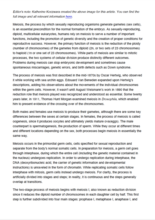Filter my results


Meiosis, the process by which sexually-reproducing organisms generate gametes (sex cells), is an essential precondition for the normal formation of…
MeiosisReproductionHuman Development
Written, produced, and directed by Toby Mcdonald, the 2005 National Geographic Channel film In the Womb uses the most recent technology to provide an…
LiteratureHuman DevelopmentReproductionMoviesFetus
The Cystic Fibrosis Transmembrane Conductance Regulator (CFTR) gene was identified in 1989 by geneticist Lap-Chee Tsui and his research team as the…
Cystic FibrosisReproductionCongenital DisordersHuman Development
In humans, multi-fetal pregnancy occurs when a mother carries more than one fetus during the pregnancy. The most common multi-fetal pregnancy is…
ReproductionFetusHuman Development
The most-watched NOVA documentary ever made and a revolution in the understanding of human development, The Miracle of Life (abbreviated Life)…
LiteratureReproductionHuman Development
Stem cells are undifferentiated cells that are capable of dividing for long periods of time and can give rise to specialized cells under particular…
Stem CellsReproductiondifferentiationHuman Development
The Public Broadcasting Station (PBS) documentary Life's Greatest Miracle (abbreviated Miracle, available at http://www.pbs.org/wgbh/nova/miracle/…
LiteratureHuman DevelopmentReproductionMovies
In the US, one in 1000 births is affected by neural tube defects (NTD). A neural tube defect is a birth defect involving the malformation of body…
Neural Tube DefectsReproductionCongenital DisordersHuman Development
Ovum Humanum was written and compiled by Dr. Landrum Brewer Shettles while he worked as a doctor in New York. The publication contains an atlas of…
LiteraturePublicationsReproductionHuman DevelopmentOva
Twin-to-Twin Transfusion Syndrome (TTTS) is a rare placental disease that can occur at any time during pregnancy involving identical twins. TTTS…
Fetofetal TransfusionReproductionFetusCongenital DisordersHuman Development